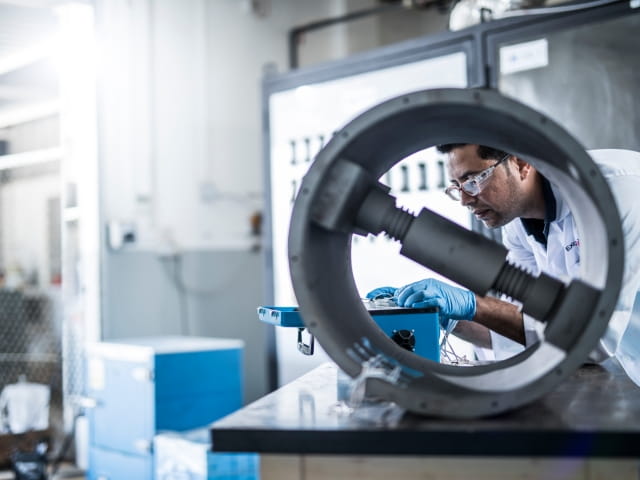In oil and gas production environments, hydrogen sulfide(H2S)is often encountered. The presence of ‘wet’H2S,也知道wn as sour-service, can result in cracking and failure of carbon and low alloy steels as well as corrosion-resistant alloys (CRA’s). Therefore testing and qualifying these materials to ISO 15156 / NACE MR0175 requirements is critical for sour-service applications.
Testing to NACE MR0175 / ISO 15156 requirements
Testing and qualification to the provisions of ISO 15156/NACE MR0175 are split into two separate categories:
- Part 2 for carbon and low alloy steels and
- Part 3 for corrosion-resistant alloy’s
For carbon and low alloy steels, Part 2 of the standard covers the testing and qualification requirements for sulfide stress cracking (SSC), hydrogen-induced cracking (HIC), and stress-orientated hydrogen-induced cracking (SOHIC). For all of the carbon and low alloy steel cracking modes, the highest susceptibility exists at ambient temperature. Additionally, the critical environmental factors to consider are the solution pH and partial pressure of H2S.
For corrosion-resistant alloys, Part 3 of the standard covers the testing and qualification forsulfide stress cracking (SSC),stress corrosion cracking (SCC), and galvanically-induced hydrogen stress cracking (GHSC). For stress corrosion cracking, the most significant susceptibility occurs at ambient or low temperatures. For stress-corrosion cracking, the highest susceptibility is usually at the maximum operating temperature or an intermediate temperature (i.e., 80 – 100 °C) in the case of duplex stainless steels. For corrosion-resistant alloys, with the exception of temperature, the critical environmental factors are the solution pH, chloride concentration, and the partial pressure of H2S.
The Element advantage
Element Materials Technology has an integrated global network of laboratories that offer the complete range of sour-service tests for the qualification of your materials to the requirements of MR0175 / ISO 15156. Testing is conducted in accordance with NACE TM0177 (SSC / SCC / GHSC), NACE TM0316 (SSC / SCC), NACE TM0284 (HIC), NACE TM0198 (SSRT) and BS8701 (Full Ring). In addition to testing, Element’s experts, with extensive experience of the MR0175 / ISO 15156 standard, can offer guidance and advice on the interpretation of the standard and the selection of the most appropriate test program for your application.Contact our corrosion expertsto learn more.
making certain for nearly 190 years
More from Element

Sour Service Corrosion Testing
Element is one of a few ISO certified sour service labs in the world, providing sour service corrosion services for a variety of test types including NACE MR0175/ISO 15156.
Read More

Sulfide Stress Cracking (SSC) Testing
Element's SSC (Sulfide Stress Cracking) testing according the NACE TM0177/ ISO 15156 standard helps ensure sour service pipelines’ reliability and longevity.
Read More

Stress Corrosion Cracking (SCC) Testing
Element’s Stress Corrosion Cracking (SCC) testing evaluates the susceptibility of metals to cracking failure under tensile stress and corrosion.
Read More

Hydrogen Induced Cracking (HIC) Testing
根据NACE TM0284,Element的HIC测试评估酸性环境中氢诱导裂缝的材料敏感性。
Read More




